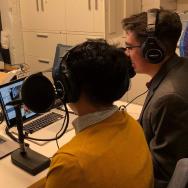In the living room of her Hyde Park apartment, University of Chicago graduate student Yuqing Zhu holds up Precession, her latest artwork, next to a print by Italian artist Giorgio de Chirico.
Both depict shadowy colonnades, but Zhu adds personal flourishes: a self-portrait, tinted green; eyes, one brown and one blue, peering through floating glasses; a disembodied smile. An artist and a second-year PhD student in neuroscience, Zhu’s two passions both represent chances for her to turn inward.
“Art and neuroscience require different kinds of effort,” she said, “but the core of it is just curiosity, expression and understanding of self.”
Working in computational neuroscience, Zhu trains computer models to perform visual tasks to better understand vision. That training has changed how she thinks about sight, helping her understand that what she sees is “the manifestation of the physics of light, and how that relates to the internal biology of my retina.”
As an artist, Zhu’s work alludes not only to Western Surrealists from the early 20th century, but to her own identity. Relying heavily on her Chinese heritage, Zhu draws characters in fanciful qipaos (one-piece Chinese dresses dating back to the Manchu era) or wearing Chinese army hats that nod to recent history. She also explores recent Chinese history, narratives she is familiar with thanks to her parents and grandparents.
As a first-generation immigrant, Zhu said, these images and stories represent “a way for me to reconnect.”
When she came to the United States at seven years old, Zhu prioritized fitting in at school in North Carolina, where she lived for a year before moving to Cupertino, California.
“At the time, I was very focused on not being Chinese,” she said. “I feel like I robbed myself of something that I had, and now in creating art I’m trying to regain it.”
“My heritage impacts who I am and how other people see me. It may impact what kind of artwork people expect me to create.”
A childhood Chinese art teacher influenced Zhu’s work as well. The “old school” instructor made her draw at easels for hours, rarely giving compliments. She now uses paper and graphite to make realistic drawings on paper, but mixes in atypical loose pigments such as pots of eyeshadow—softer than pastels, and good for adding a flush of color to the skin.
“He taught me a lot of discipline, to really love creating, and really good technique,” Zhu said.
Her imagination is often sparked by a fleeting image, a time of year, stray words or other art. The title of Sir Frederic Leighton’s 1895 oil painting Flaming June—depicting a sleeping woman in a billowing orange dress—reminded Zhu of her birth month, prompting her to draw a self-portrait in a similar style.
Surrealists like Leonora Carrington and Remedios Varo also inspire her, as do self-portraits by artists such as René Magritte, Gustav Klimt, Egon Schiele and Frida Kahlo. Surrealists, Zhu said, often dealt with the idea of the impossibility of seeing, which connects directly to her scholarship.
“Magritte stated, ‘We always want to see what is hidden by what we see,’ and that is incredibly insightful in terms of sensory neuroscience,” Zhu said. “I’m fascinated by the neuroscience of visual perception, precisely because of the constructed nature of reality conveyed to us through our senses.”
In addition, Zhu looks to late Chinese photographer Ren Hang and other contemporary Chinese artists. The works of those still living in China, she said, help her understand that her heritage doesn’t only take place in past tense.
This fall, Zhu will teach a course at the School of the Art Institute on light and vision, drawing on her work in the neuroscience field and her lifelong training as an artist.
“If you know how vision and light work,” she said, “and how artists have been exploiting our perceptual abilities and the science of how we see things for a very long time, you have a more full understanding of what it means to appreciate visual art.”
—This story was adapted from the UChicago Arts blog.

